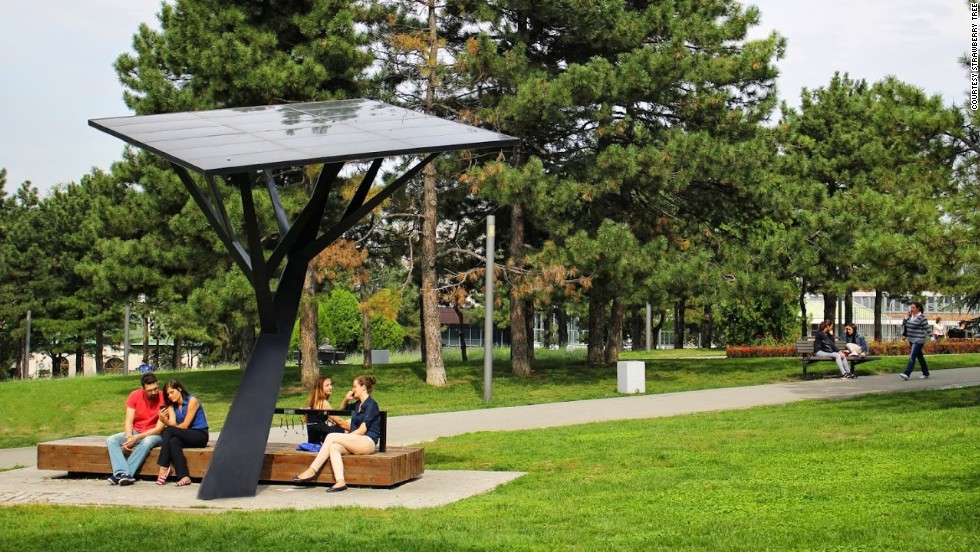Worldwide, countries are beginning projects that incorporate the sun’s energy instead of fossil fuel energy which most states have come to rely on. Although there are many fascinating projects globally, I will refrain myself from speaking about all of them at length, and will instead focus on just three countries that are doing cool things: Serbia, Finland, and The Netherlands.
Serbia has a really interesting new project called Strawberry Tree. Strawberry tree is a charging station created to help those of us who forget to charge our phones overnight and then discover midday that we’re in desperate need of charging. The coolest part about Strawberry Tree is that it’s entirely solar-powered; it can even continue to run for 20 days without sunlight, in case the weather happens that way. Other cool features are that it can measure air pollution, UV-radiation, and noise levels. Strawberry Tree is made from 98% recyclable materials, and in December 2014 there were already 12 different Strawberry Trees across Serbia, including Belgrade as well as smaller towns. One of the best parts about this is that many of the people who use Strawberry Tree have never really used clean energy before. The more we can introduce people to the possibility of using more clean energy, the easier it will be to lessen our fossil fuel dependence.

(People charging their phones with Strawberry Tree in Serbia. Source: http://i2.cdn.turner.com/cnnnext/dam/assets/141126105815-strawberry-tree-2-horizontal-large-gallery.jpg)
In Finland, there is a beer company that wants people to experience solar energy in the most appetizing way possible: through food. The Lapin Kulta solar kitchen (http://lapinkultasolarkitchenrestaurant.com/) first opened in Helsinki but continues to have pop-up restaurants all over Europe. It is especially popular in Southern countries that get more sunlight, because naturally, the kitchen can only operate on sunny days. A Milan location just opened up, and the reception to this restaurant has been very positive.
(Source: https://vimeo.com/26867515)
The Netherlands are already known for being a green country, with some of the most impressive bike lanes in the world. However, these bike lanes are becoming even better. The country has some 250 miles of bike paths, and in 2012, the country had planned to cover these paths in crystal silicon solar cells underneath a protective layer of glass, making it safe to bike over. This endeavor planned to generate 50 kWh per square meter each year and the country had decided to put that energy towards powering traffic lights and other city needs. These bike paths would also be able to store energy, so that there would still be power flowing on rainy days and fuses wouldn’t blow on days where it was too sunny.
(SolaRoad. Source: http://rack.2.mshcdn.com/media/ZgkyMDEyLzA0LzA0LzA5XzAzXzQ5XzI2OF9maWxlCnAJdGh1bWIJMTIwMHg5NjAwPg/037333c4)
Sources:
http://mashable.com/2012/01/04/innovative-solar-energy-tech/#AagXppLt0iqS
http://www.cnn.com/2014/12/15/world/europe/strawberry-tree-solar-charger/
http://lapinkultasolarkitchenrestaurant.com/

We have 2 similar ideas! I think the solar roadways could be a great way to capture the power of the sun. The surfaces exist, and instead of serving no additional purpose past a place to drive, it would be great if they produced power, even the power to charge our cars!
Assignment Desk offers top-notch Chemistry Assignment Help, ensuring thorough research and timely delivery. Their experts provide precise and reliable solutions, making complex topics manageable and boosting academic performance. Trust Assignment Desk for all your assignment needs.
When preparing for IELTS, one of the key aspects to consider is the IELTS exam fee. The fee is generally around $200 to $250, but this can vary depending on where you’re taking the exam. While this may seem like a significant expense, it’s an investment in your future, especially if you’re aiming for admission to international universities or applying for a visa. The IELTS exam fee covers all four sections of the test and is typically non-refundable, so it’s important to be well-prepared. Some countries also offer financial aid or sponsorships to help with the cost, which could be worth exploring.
Mock tests are a valuable resource for anyone preparing for the IELTS exam, especially the listening section. An ielts listening mock test offers a structured way to practice listening to various accents, from British to Australian, ensuring you are fully prepared for the types of audio you’ll encounter in the real exam.